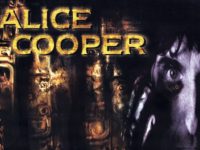In the early 1970s, an obscure avant/psychedelic band from Phoenix, Arizona going under the odd name Alice Cooper relocated to the Detroit area in the hopes of kick starting their floundering career. After teaming up with producer Bob Ezrin, they changed their approach and proceeded to crank out four classic albums: Love It to Death (1971), Killer (1971), School’s Out (1972) and Billion Dollar Babies (1973). In the process, they invented the genre of shock rock as a subdivision of heavy metal, and set a new standard for what could pass for a rock ‘n’ roll show with their macabre and highly theatrical stage presentation.
But the band ran out of steam and packed it in within the next couple of years, and lead singer Vince Furnier – a/k/a Alice Cooper himself – went on to have a successful solo career as an amiable celebrity rock star, touring and occasionally releasing loosely based concept albums or standard sounding hard rock/metal recordings.
Unfortunately, Alice never again seemed to achieve the sound he did with the band on those aforementioned gems. Perhaps the underlying issue is that, like rock fandom in general, Alice himself has confused his contributions to popular culture with his musical roots. Yes, the aggressive proto-metal sound and the extreme theatrics were always part of the overall package, but Alice Cooper (the band) during their heyday was equally indebted to a third influence. Simply put, Alice Cooper was at heart a garage band.
Garage rock, which was a North American phenomenon that occurred during a small window of time from roughly 1963-1968, didn’t come fully formed into existence as a genre; it only acquired its name retroactively after the release of the 1972 compilation album Nuggets, compiled by none other than future Patti Smith Group guitarist Lenny Kaye. The album documented the energetic and raw recordings of regional bands across the country, some aspiring professionals, others simply inspired amateurs. Most sessions were done quickly and on the cheap, further adding to the immediacy of the performances.
If one looks into the history of the original Alice Cooper band, these aspects become just as obvious as the others for which they are better known. For instance, most heavy metal groups feature elite players; Alice Cooper, though competent, were never considered to be great musicians. Though their albums often centered on long, theatrical production pieces, they also contained three minute wonders like “Caught in a Dream” or “Under my Wheels” – even the big hit single “School’s Out” is cut from the same cloth. Finally, there’s the voice of Alice Cooper himself: it comes across as having an everyman sort of tone compared to heavyweights like Robert Plant, Bruce Dickinson, or Ronnie James Dio in terms of power and range. Even then, that’s misleading: despite him coming across as just-plain-folks, you rarely need a lyric sheet to know what The Coop is singing.
The exception that proves the rule is 2003’s The Eyes of Alice Cooper, an album that by accident or design is as close as it comes to the classics from the glory days. Drums that sound like real drums, not the metal cannon snare shots that typified ’80s and ’90s hard rock. Songs that (except for one ballad) don’t clock in at over four minutes. Recordings that sound like they could be live in the studio with few overdubs.
“Bye Bye Baby” features the same horn-section-in-a-hurricane featured on classics like “Under My Wheels” and “Elected.” “Detroit City” is a tribute to the old days and features a guest appearance by Wayne Kramer of the MC5. (They even manage to conjure the ghost of the Stooge’s Fun House with some snaky saxophone during the wind out.) And “Man of the Year”? Let’s just say Alice is one of the few lyricists who can use the word “prostrate” in a song and make it funny.
The Eyes of Alice Cooper could be Alice Cooper’s great lost garage album – large chunks of it, anyway. But maybe because of its very nature, it will always be relegated to that place where resides everyone’s perfect endless summer, somewhere between 1963 and 1968 – a place where we can all ignore our musical roots and party like it’s 1999, or 2003, or whatever.
- How David Bowie’s ‘The Next Day’ Stripped Away All of the Artifice - March 15, 2023
- Why Deep Purple’s ‘Who Do We Think We Are?’ Deserves Another Listen - January 11, 2023
- In Defense of the Often-Overlooked Mott the Hoople - November 10, 2022



